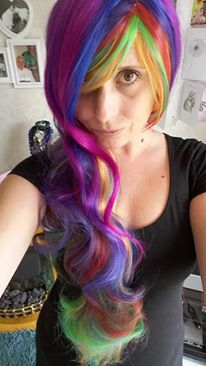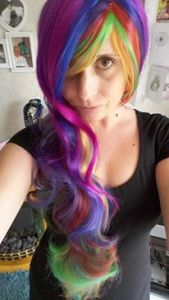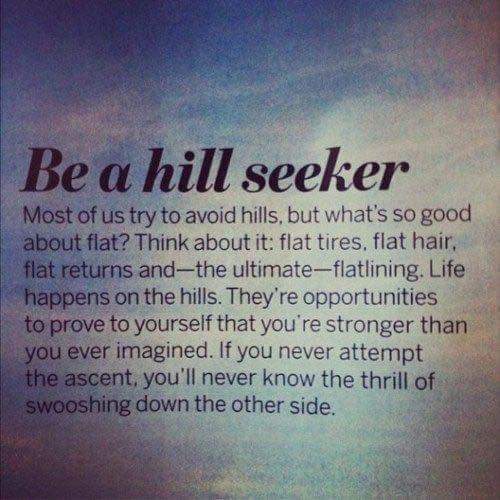September is Blood Cancer Awareness Month so we thought this was a great time to share the story of one of our founding Directors, Ceinwen.
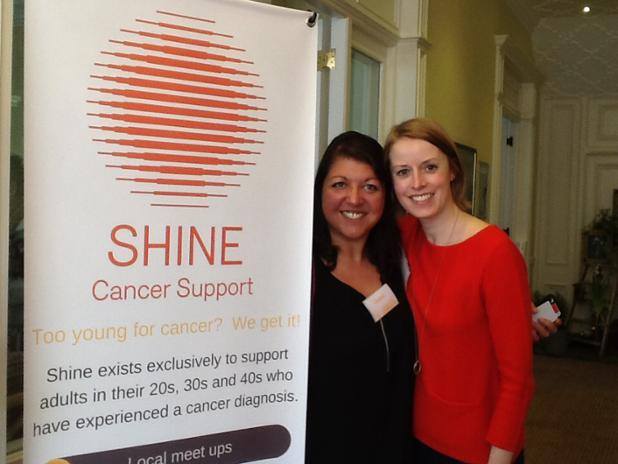
Ceinwen (right) with Emma at Shine’s 2016 Great Escape
Diagnosed with Stage 4b diffuse large-b cell lymphoma in 2010, Ceinwen now runs Shine with Emma (look out for her profile soon for #BreastCancerAwarenessMonth) and heads up our fundraising activities, as well as designing our national programmes with Emma, our other Trustees and our amazing volunteers. Having been through cancer, its treatment and its aftermath, Ceinwen’s insight and experience is key to what we do at Shine and helps to ensure that all of our activities meet the needs of young adults with cancer. Read on and please share with others!
When were you diagnosed and what with?
I was diagnosed with Stage 4b diffuse large b-cell lymphoma in February 2010.
How did you find out you had cancer?
At the end of December 2009, I was pregnant. I became really unwell and had my daughter prematurely. The doctors thought that I was experiencing complications from the birth so I don’t think they took things too seriously at first. About three weeks later, I developed such excruciating back pain that I ended up calling an ambulance and going to the hospital. They gave me antibiotics but when I didn’t feel any better the next day, I went back. I then spent three and a half weeks in the hospital seeing all kinds of doctors who were trying to figure out what was wrong with me. Tuberculosis was looking like a good candidate for a while and I remember thinking “that doesn’t sound so bad” but after a chest x-ray they realised I had a large mass in my mediastinum (a part of the body I’d never heard of before!). They also discovered I had “lesions” on my liver – at the time, I also didn’t realise how bad that sounded. Eventually, someone got a haematologist to look at me and he put all the symptoms together. I’d had night sweats, fevers, loss of appetite and unbelievable fatigue – all typical symptoms – but no one had realised I had lymphoma.
What did you think and feel when you were diagnosed?
I had barely heard of lymphoma when I was told I had it. I knew nothing about cancer and was obviously worried I was going to die. I
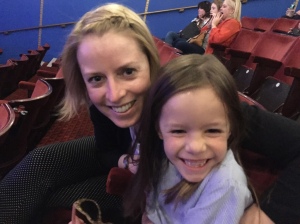
Ceinwen & her daughter today
was devastated and worried I wouldn’t get to see my daughter grow up. And then pretty quickly I went numb. I generally managed to hold it together during the day but spent a lot of nights panicking and crying. I was also told that I would have to stay in the hospital for six months receiving chemo and I remember wondering how my husband and I were going to manage work and a baby and cancer all at the same time.
How did the people around you react?
I think they were as shocked as I was by the diagnosis. I had never heard of anyone having cancer and a baby at the same time and neither had my friends or family. I remember thinking “Cancer and pregnancy is a thing?”. For the most part though, they rallied around. I had family and friends come to stay and look after my daughter and help my husband out. I was never short of visitors! If there’s one thing cancer taught me, it is how much I am loved. Whenever I have a bad day now I try to remember that.
What treatment did you have?
I was put on a clinical trial testing a high-dose chemotherapy regimen called R-CODOX-M/IVAC-R. I had a Hickman line and two of the rounds had 15 days of chemo followed by a recovery period, while the other two rounds were 7 days of chemo followed by a recovery period. Part of the treatment is having “IT chemo”. I remember seeing that on my treatment sheet and not knowing what it was. It turns out it is chemo injected into your spine. I was horrified! For me, that was the worst part of the treatment. I had to have it done 8 times and I’d already had a few lumbar punctures and a bone marrow biopsy by then, so by the time I finished treatment I never wanted anyone to go near my spine or back ever again!
How did you feel through treatment?
I know for a lot of people chemo makes them feel terrible, but I was so ill when I started that the treatment made me feel better. I’d been so weak that once the chemo kicked in and started to push back the cancer I felt totally different. I had a period of time where I went days without brushing my teeth or getting out of bed. To be able to get up and take a shower felt like a miracle.
What happened after treatment finished?
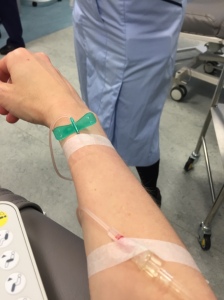
Monthly immunoglobulin infusion done at the hospital
For about a year after treatment, I focused on getting my fitness back. Spending six months in bed is terrible for you and I found it hard to walk for long periods because my feet and back ached. Just as I was getting back into running, I caught meningitis. I ended up back in the hospital for a month and it was then that the doctors discovered that my immune system had really taken a hit as a result of one of the drugs I’d had. My body basically doesn’t produce b-cells properly anymore so I need monthly immunoglobulin replacement therapy to prevent me from getting any more infections. Immunoglobulins are super expensive so I like to think of myself as a million dollar woman.
Tell us about your work with Shine
Shine is my and Emma’s baby! Both of us were diagnosed with cancer as young adults and we both found there was a real lack of support out there. If you aren’t a child or teenager, you get lumped in with elderly patients who may be lovely, but they don’t get what you’re going through. I remember mentioning to some people that I volunteered with how I was missing loads of work because my appointments took all day and they said “Oh, I just pack a lunch and make a day of it”. We had very different perspectives!
I met Emma at the end of 2010 and found out she had started a support group in Dorset called Shine. I’d wanted to do the same thing in London so we decided to work together. Since then, we’ve grown Shine into something bigger than we ever imagined six years ago. Our first workshop in April 2012 had about 20 people at it. Last year, our Shine Connect conference had 100. It’s been amazing to see how many people we’ve been able to reach and support. I always thought that I wouldn’t want anyone else to feel as alone as I did when I was diagnosed. I hope with Shine we’re helping to make that happen.
What difference has Shine made to you?
Apart from loving my job, Shine has also given me friends and support that I didn’t have back in 2010. I still get regular check ups, and aches and pains still freak me out. It’s good to have people I can call up to share my worries with – people who totally get it because they’ve been there. I frequently diagnose myself with other forms of cancer – cancer of the toe, cancer of the eyebrow, etc. etc. – and it’s really good to have friends who understand exactly why I’d be concerned that the bruise on my foot is cancer (and to explain why it’s probably not)
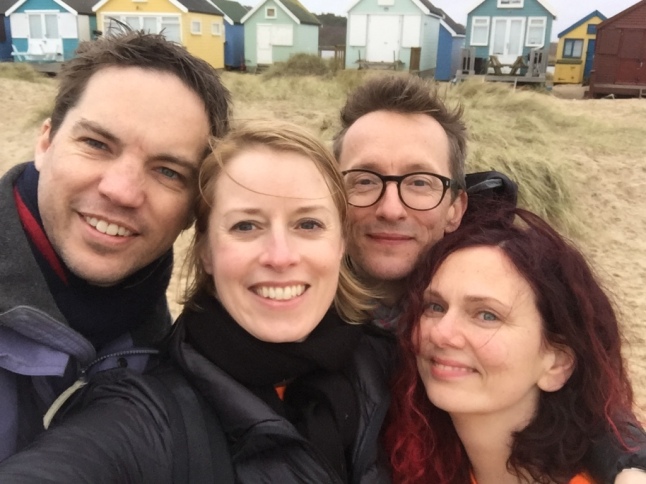
Ceinwen with some of Shine’s peer supporters at the 2016 Great Escape
How do you feel now about your experiences? What‘s been the biggest change you’ve faced?
I think it can be hard to feel positive about something so awful, particularly something that changes your life so fundamentally. All of the things I thought I would have in terms of family and career changed when I was diagnosed. I was working in international development when I got sick and I remember my doctor saying that the sort of travel I used to do wasn’t an option, at least in the short term.
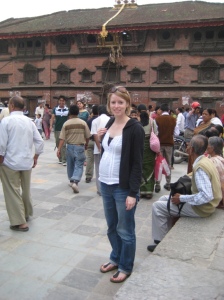
Ceinwen working in Kathmandu, Nepal while pregnant – shortly before getting ill.
You can’t ever go back to who you were before, as much as you might like to. Some days, that really sucks. Having said that, I’m in a good place now! I absolutely love all the work we do at Shine and have a lot of fun. I’ve laughed more in the last six years than I did in the six years before that. Having a few life threatening illnesses does give you a different perspective on things!
If you could give one piece of advice to yourself before your diagnosis what would it be?
I remember being really annoyed that I’d managed to get so ill because I thought I was taking care of myself – I was a vegetarian and exercised a lot. Obviously I got sick anyway, so I’d probably tell myself to eat more cake.
You can read more personal profiles from Shine’s community here. Shine also has an private online community that we run via Facebook. To join, send us a request and then send a message to us through our main Facebook page.

